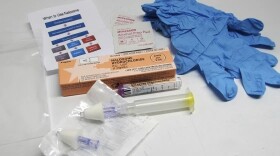-
A federal judge in Illinois quickly issued a restraining order after the Trump administration slashed more than $600 million in CDC grants to four blue states.
-
James Van Der Beek's death at age 48 highlights a sad statistic: More people under 50 are getting colorectal cancer.
-
Elite athletes often push through pain to achieve victory. But, everyday exercisers need to distinguish between soreness which is normal and pain which is the body's way of telling you to stop.
-
They're often paid low wages and lack job protections. A petition to the country's supreme court to support their demands did not see success — and they are protesting.
-
Drugs like Zepbound and Wegovy are intended for people who are overweight. Some patients are using them after bariatric surgery to keep pounds from creeping back. Others may just want to lose a few pounds.
-
Friendship expert Kat Vellos shares tips on how to make a new friendship stick, including what to do together, how often to hang out — and what to do if the vibes just aren't there.
-
GoodGym, based in the UK, combines exercising with volunteering. How does this combination positively impact people?
-
The immigration crackdown in Minneapolis has pushed many people in the city to stay at home for the last few months. Doctors say the trend is alarming, and may have lasting effects.
-
Rucking is walking with weight on your back.
-
More than 920 people are now infected with measles in South Carolina as the outbreak there grows, and smaller outbreaks hit Florida, Arizona and Utah. Dr. Ashish Jha said when considering vaccines, parents should listen to their kids' pediatricians, not politicians.
-
This year’s extreme winter weather combined with a higher than normal flu season has caused the national blood supply to remain at critically low levels.
-
The Trump administration says its new website TrumpRx offers the lowest prices in the world on 43 brand-name drugs and counting.












